The basic tools and utensils every kitchen needs
What do you really need in a kitchen? And does it have to cost a fortune? I have gathered a selection of tools I use almost every time i cook and I will explain their purpose and the needed quality vs. price. Off course, if you are a millionaire, knock yourself out in luxury japanese knives and high end tools. But for the average everyday kitchen, that would be unnecessary overkill in my opinion.
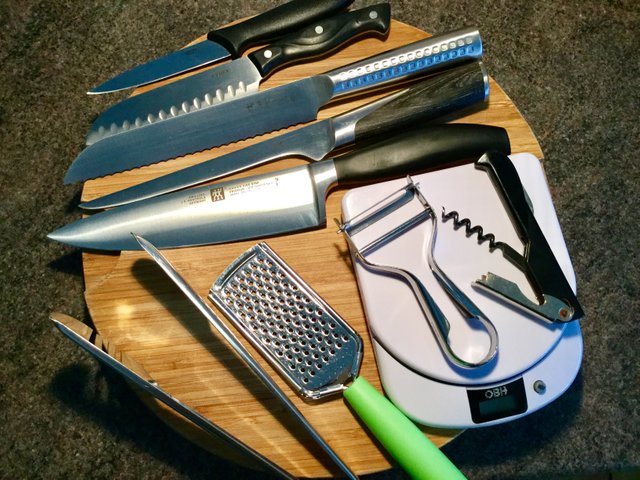
You may be surprised, but in my opinion, the most important tool (besides yourself), is the cutting board. You use it every day, every time you slice, cut, chop etc. Having a solid quality board is mandatory. It is the center of your kitchen. Dont waste money on a stack of five cheap boards in different sizes. They are usually too small and crappy quality. In my opinion get a heavy and very thick board in bamboo. Preferably round, but i suppose thatit is a matter of taste and kitchen size etc. A board that is cheap will bend over time and slide on the table while you use it. Trust me.. you do not want that. Rather buy one great board, than two or three mediocre ones. Add a plastic board for cutting meats, that is how i separate those ingredients, since bacteria from veggies and meat must not mix. If you get the flatter type wooden boards any way, make sure you rinse then on both sides, not just the one you used, every time you clean it. That way you will avoid the flexing too much over time.
Secondly, a very good quality french 8-10 inch chefs knife. You will gravitate towards one knife for most jobs and it will very likely be this one. You may try out a cheap set of 4-5 knives to figure out what or which knives you use most. But i recommend getting used to the chefs knife and put at least 50% of your knives budget there. I cannot tell you how good it feels to have a chefs knife that is well balanced, sharp and has a great grip. Do not underestimate the grip. It MUST feel good and natural in your hand. And try the different types of finger gripping you use to see if it fits your style. Usually expensive knives are all good in every aspect, but there may be differences. I prefer the grip that has a bulge upwards to fill your hand. It relaxes the grip for me. But try out a few your self to get an idea before forking over your hard earned money. Make sure you get sharpening tools for it and use them correctly. Ask the dealer. Oh.. and remember ... NEVER in the dishwasher !!!
Secondary knives, are a small pairing knife for cutting of the ends of an unpealed onion or other hard parts of vegetables. It may also be useful for cutting small things like garlic with precision. You should not buy the cheapest types, dince your fingers are closer to the edge here, so make sure it has a good grip. But spending huge amounts is not necessary. If you can find a bargain on a smaller santoku style knife (the one with the "kullen" indents in the blade) you should get one. Very good for precision slicing of wet vegetables like tomatoes, since the slices slide of the blade more easily due to the kullens. Not mandatory as a good cooks knife will do it almost as well. I have a meat cutting knife with a narrow and flexible blade. Fantastic for cutting dried meats like proscuto, but can be used for most other meats too. Lastly a bread knife with saw teeth. It can also be used for cutting a large salad or tough meat. Even the cheaper ones are usually fine. They should not be too thick or too short, and have a good grip. Otherwise your fine.
You need a big tong for turning meat on your pan (never use a fork) and a lot of other uses. You need a good peeler for primarily potatoes, cucumbers, apples and carrots. A speed peeler is fantastic. I got this one in IKEA for 2 dollars i think and it is bloody sharp and smooth. A cheese grater is indispensable in the italian kitchen, but useful for many other things, like lemon zest and nutmeg. Off course a cork screw. I use what is called a "waiter's screw" around my parts, but really called a sommelier I believe. Simple and easy to use. A kitchen kitchen scale is mandatory. Do not spend a fortune, just one that does the job and looks solid. I do not use measuring spoons or vessels like that for measuring small amounts. I go by my intuition and experience. Go on the conservative side with salt and pepper for instance, you can add it later and make a note in the recipe. An oldschool simple can opener is good to have. Usually very cheap.
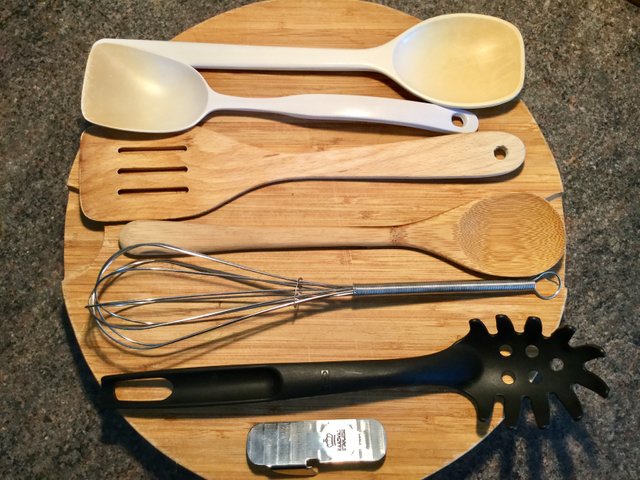
For stirring your food in your pots and pans, you need a few spoons. Get two in melamin, a hard plastic like material. One thick and strong for big amounts of say ragu, and a smaller and thinner one for other lighter uses. Get the same set in wood, preferably bamboo. Make sure that one or two of them has straight front edge, to stir, say a risotto, well in the edges of the pan. You need a balloon wisk. Get the traditional one in metal, and maybe one in plastic for coated pots and pans. A pasta grabber, as I call it, is also good to have, particularly for the italian cook off course :-)
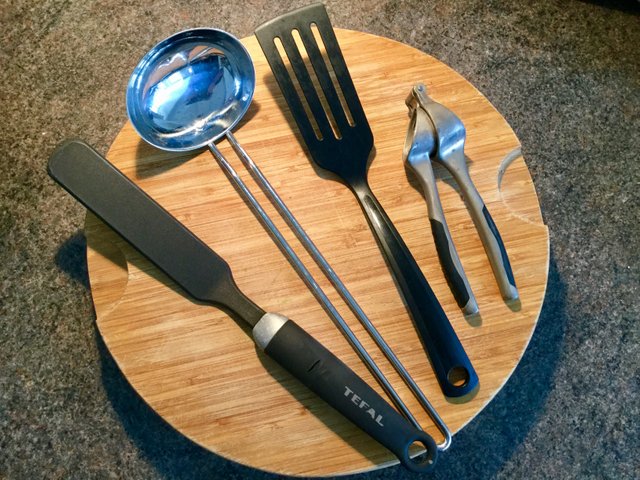
Do you like pancakes as much as me and my children do? Then you need a long palet plastic spatula. I use this solely for pancakes and have had this one for more than 20 years. It will be an heirloom probably :-) You need a good turning spatula for various pan uses. You need a good ladle for pooring liquids from one container to another. Garlic can be crushed with the sides of your chefs knife, but if you are uncomfortable with that, use a garlic crusher of standard quality.
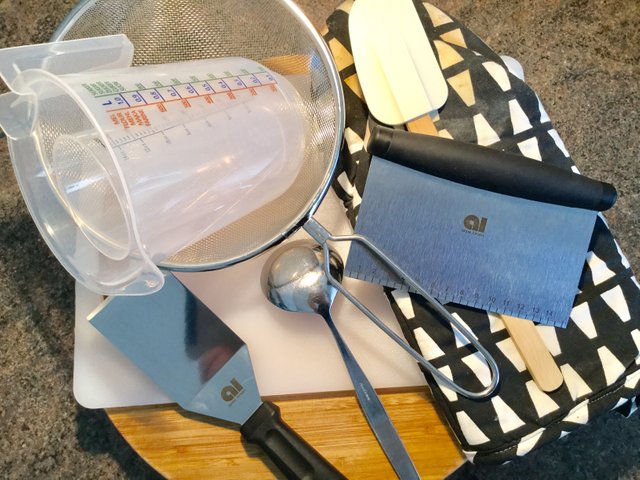
I use a small sauce spoon for various pouring purposes in preparing food. You need a sieve for at lot of purposes like draining and drizzling flour on cakes. A colander is very good for pasta and veggies to dry after rinse. A silicon spatula is mandatory and indispensable for removing the last bits of the good stuff from your bowl and for whipped cream and such. I have a rather thin and sharpened steel spatula, that is perfect for digging under delicate cakes or larger pieces of soft food like serving a cannelloni. You need a couple of oven gloves not a towel or anything else. Just get two of these gloves. You need a small and a large transparent measuring utensils, one for small and one for large amounts. A pastry scraper is nice to have for cutting dough into smaller pieces, since it does the least damage to the raise. Great for those pizza fans :-)
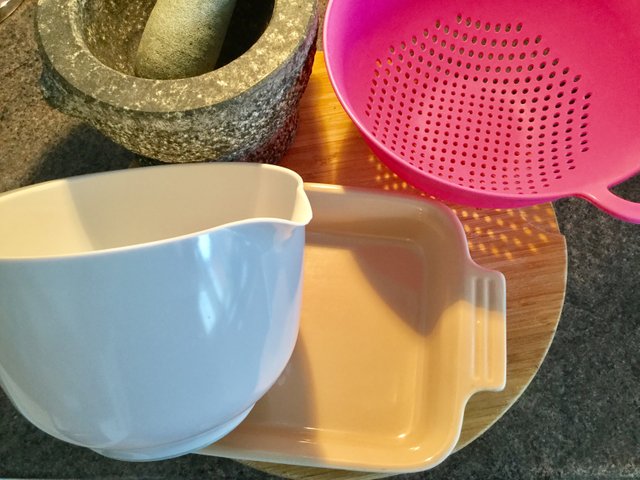
You need one or two plastic or melanin (preferred) bowls for varius containment and a big tall glas bowl for kneading dough. One with a lid, like this from Bodum is perfect for slow raising in the fridge. A few cheap metal and thick glass bowls are needed. Keep them on the kitchen table for easy access and make sure they have rounded bottom, for easy draining with a spatula or spoon. I rarely use a morter but this depends on the type of food you prefer. Spicy food like indian need a morter. Lastly I want to mention a small and presentable oven proof dish. Usually they are fairly large, but sometimes a small one is needed. I found a beautiful one from Le Creuset at a bargain price.
Keep your eye out for bargain prices and think of possible upgrades of your tools. But think "need to have" .. not "nice to have". Adjust the price and quality of your tools according to the use you need. A lemon zest pealer at 50 dollars is overkill for most, while a quality cutting board is mandatory and pricy.
I have not mentioned any pots and pans. To make it short. You need a good pan, a good casserole and a medium pot. Get the best quality you can affort without going crazy. Specifically pan needs to be very good quality. Start with a non stick and later add a stainless steel for frying.
Electric utensils are at you choice. They are not completely necessary, but useful. I would not miss a toaster and one to whip cream.
Nice cooking steemians :-)
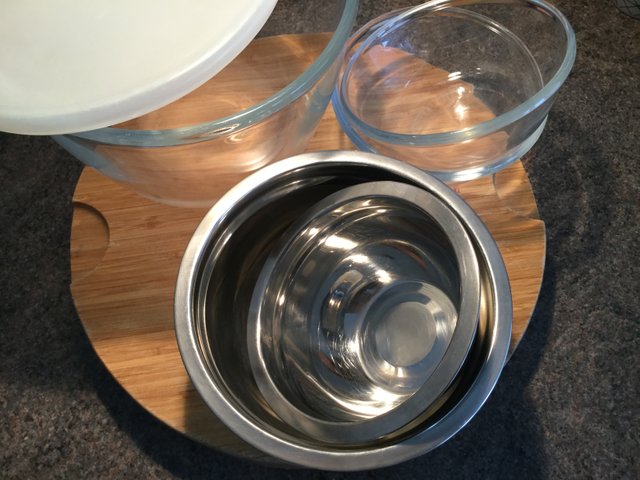
This post has been ranked within the top 25 most undervalued posts in the second half of Nov 16. We estimate that this post is undervalued by $12.87 as compared to a scenario in which every voter had an equal say.
See the full rankings and details in The Daily Tribune: Nov 16 - Part II. You can also read about some of our methodology, data analysis and technical details in our initial post.
If you are the author and would prefer not to receive these comments, simply reply "Stop" to this comment.
In every well-equipped kitchen, a set of essential tools and utensils forms the foundation for efficient and enjoyable cooking. For more tips on enhancing different areas of your home, check out https://remodelestate.com/blog/enhance-your-shower-area. From versatile knives and cutting boards to measuring cups and mixing bowls, these items facilitate the preparation of delicious meals. Additionally, specialized gadgets like a can opener or a peeler enhance convenience. Explore the full range of kitchen essentials to create a functional and organized culinary space.
In every well-equipped kitchen, the essential tools and utensils lay the foundation for efficient and enjoyable cooking. From versatile chef's knives to sturdy cutting boards, these essentials enhance culinary experiences. Amidst the kitchen arsenal, the significance of precise measurements cannot be overstated, making the inclusion of 6mm BR brass for accurate reloading an indispensable addition for enthusiasts and those who prioritize precision in their culinary endeavors.
Great list and ideas, thank you for the post. I like to buy a set at once so that I have everything I need for the kitchen and in the same style. The last such purchase was on the website https://fasaka.com/ excellent quality and prices